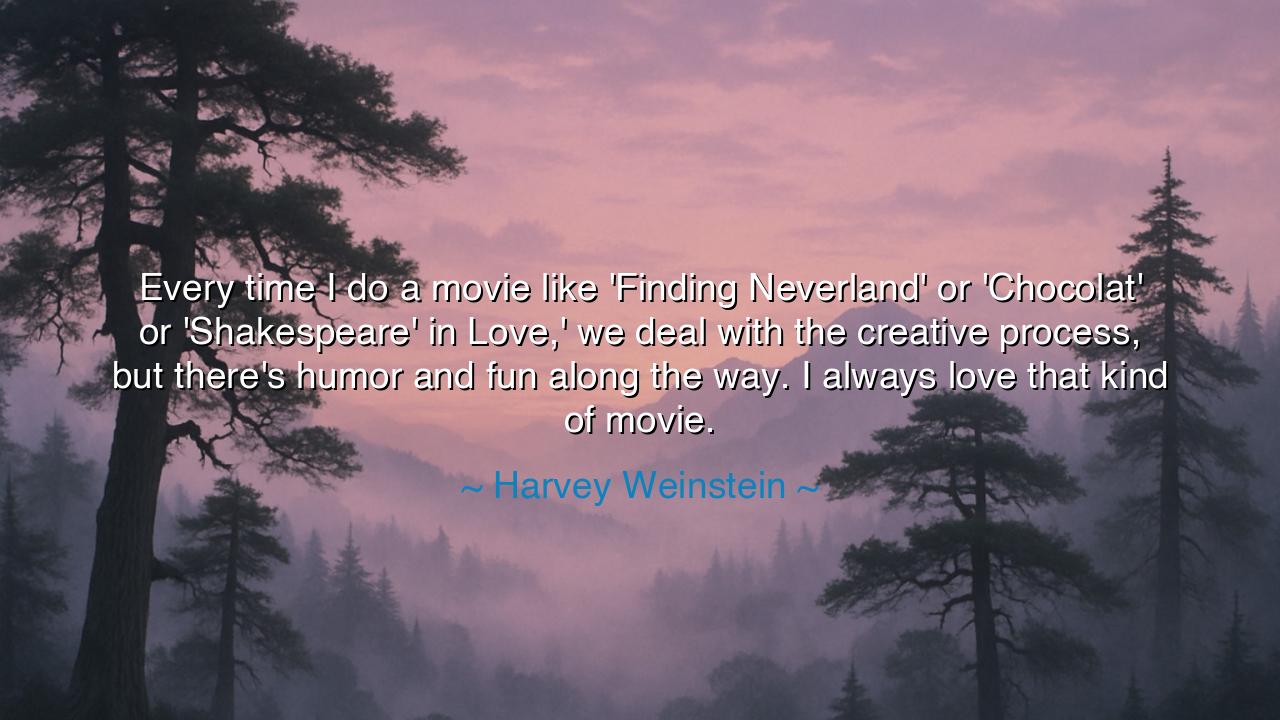
Every time I do a movie like 'Finding Neverland' or 'Chocolat' or
Every time I do a movie like 'Finding Neverland' or 'Chocolat' or 'Shakespeare' in Love,' we deal with the creative process, but there's humor and fun along the way. I always love that kind of movie.






The producer Harvey Weinstein once said: “Every time I do a movie like Finding Neverland or Chocolat or Shakespeare in Love, we deal with the creative process, but there’s humor and fun along the way. I always love that kind of movie.” Though born in the modern world of cinema, these words carry the resonance of an ancient truth — that creation is not merely labor or intellect, but a dance of joy and struggle, of discipline and delight. Within this statement lies the eternal philosophy of the artist: that the creative process is a sacred journey, and that laughter, lightness, and play are not enemies of art, but its companions.
When Weinstein speaks of films like Finding Neverland, Chocolat, and Shakespeare in Love, he names not only works of beauty but works about beauty — stories that explore the act of creation itself. In Finding Neverland, we see J. M. Barrie crafting the world of Peter Pan from loss and imagination; in Shakespeare in Love, we witness the birth of Romeo and Juliet through passion and chaos; in Chocolat, the alchemy of joy and flavor becomes an act of rebellion against sorrow. Each of these stories reveals the same truth: that creativity thrives where seriousness and laughter meet, where pain is softened by humor, and vision is strengthened by delight.
The ancients, too, understood this balance. In the myth of Hephaestus, the divine smith who forged the weapons of the gods, creation was born of toil, yet also of wonder. The sparks that flew from his anvil were not only the result of labor but of inspiration — of joy hidden even in struggle. Likewise, the philosopher Aristotle taught that play was not mere leisure but an essential part of human flourishing, for the spirit must breathe even as it works. So when Weinstein speaks of “humor and fun along the way,” he calls back to this eternal wisdom: that to create well, one must first live well, with a heart open to laughter, love, and curiosity.
The creative process, then, is not a march but a rhythm. It moves between effort and ease, between inspiration and rest. The greatest works of art are rarely born from suffering alone — they are born from those who, in suffering, still find a reason to smile. The painter who hums as he mixes color, the writer who laughs at her own failed lines, the composer who delights in every imperfect note — these are the true masters, for they know that creation is play in the service of truth. Their joy does not cheapen their art; it sanctifies it.
Consider the example of Leonardo da Vinci, who, though a genius of mathematics and anatomy, approached his work with childlike wonder. Between his studies of flight and form, he filled his notebooks with riddles, jokes, and whimsical sketches. To him, humor and invention were twins — both born from curiosity and love of life. His laughter was not frivolity; it was fuel for creation. So too, Weinstein’s love of films that balance depth and delight reminds us that art need not choose between meaning and mirth — it can embrace both and thus reach the fullness of the human heart.
The lesson for all who hear these words is clear: in your own acts of creation — whether in art, work, or life itself — do not drive out joy in the name of seriousness. The stern creator grows weary; the joyful one endures. Let there be laughter in your labor, for laughter clears the mind and nourishes the spirit. Let your creativity be not a burden but a feast — a celebration of the divine gift that allows you to imagine, to make, to transform.
And so, remember this ancient truth reborn in modern speech: to create without joy is to build without light. Humor does not cheapen the creative act; it keeps it human. Every story, every song, every invention that endures carries within it a spark of play — a glimmer of the eternal child that lives in all who dare to make something new. As Harvey Weinstein observed, the greatest creations are born not only of discipline, but of delight, not only of struggle, but of laughter that rings through the soul of the maker. For where there is humor in the heart of the creator, there too is life everlasting in the art that follows.






AAdministratorAdministrator
Welcome, honored guests. Please leave a comment, we will respond soon